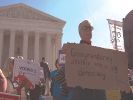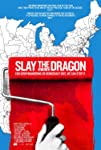Eye For Film >> Movies >> Slay The Dragon (2019) Film Review
Slay The Dragon
Reviewed by: Jennie Kermode

Political researchers continually find that the US, like the UK, is situated some way to the left of the governments it elects. There's a noticeable difference between the voting preferences that people report in properly balanced surveys and what happens at the ballot box. Why? Just take a look at a local constituency map of any major US city. Population isn't evenly distributed so one would expect constituencies to vary in size, and some odd shapes are to be expected as it's easier to have boundaries accord with streets and geographical features, but the bizarre shapes to be seen on the majority of such maps point to something else: gerrymandering. How do you ensure that elections are fair when some of the people running for election are drawing those maps?
Opening with a look at the water crisis in Flint, Michigan (which has, at the time of writing, been going on for seven years without effective intervention by any level of government), Chris Durrance and Barak Goodman's documentary asks why votes in some areas are valued more than those in others, examining the impact of electoral mapping on people on the ground. It's a blunt way to put the subject in perspective and it opens the way for discussion of how people who might be expected to vote against incumbents can be carefully split between constituencies so that their impact is spread out and diluted, effectively robbing them of influence.

What makes this a pertinent subject is that, as the filmmakers demonstrate, gerrymandering attempts became much more concerted and more widespread around the time of the 2010 Midterm elections, when certain Republican strategists went all out to secure whatever advantage they could. With a well-funded campaign aimed at state legislatures, they took control of the bodies empowered to redraw boundaries and used big data to determine exactly how best to place those lines. Through the same bodies, they were able to introduce voter ID laws aimed at making it difficult for demographics most like to vote Democrat to vote at all. Durrance and Goodman use both historic and present day examples to explain how this mechanism, which many people assume to be a neutral anti-fraud measure, can in fact be used to disenfranchise targeted groups - something which may be of particular interest to viewers in countries like the UK, where discussion about whether or not to mandate such laws are an active part of present political discourse.
Thoroughly backing up their arguments with accessible data and individual examples, Durrance and Goodman paint a grim picture, but they also look at the fightback. This focuses in part on the Voters Not Politicians campaign initiated by Katie Fahey, an ordinary Michigan woman who initiated a powerful campagn for change. It also considers Wisconsin voters' efforts to mount a legal challenge. Some of what this film depicts would ultimately influence the 2020 Presidential election, so you won't have to be American to appreciate its impact.
Although the temporal context of the film puts the focus on Republican shenanigans, Durrance and Goodman do their best to be politically neutral, emphasising that Democrats have also used gerrymandering in the past. If the film has a message, it's that ordinary people need to be alert to these risks and work together to keep democracy free from corruption. Much livelier than you might expect of a political documentary, it uses a mixture of animation, talking heads, older archive footage and recent news material to tell its tale in a way that's information dense but easy for most people to follow. If you've ever felt mistreated by the system and wanted to do something about it but not known where to start, this is an excellent primer.
Reviewed on: 05 Apr 2021
















